I’ve been reading Robin Shulman’s entertaining book “Eat the City” about the history and practice of growing food in New York City. I’ll be appearing with her in discussion at SPUR on September 13, so they kindly sent me a review copy. She opens the book with a long chapter about honey and beekeeping in New York, following a guy who has built a business out of maintaining various hives, collecting swarms when they appear, and generally being a successful entrepreneur while cultivating his rugged individualist curmudgeonliness. Shulman’s prose is a pleasure to read, she wastes no words while spinning beautiful and charming stories.
Food continues to be the main way in for a lot of folks to a practical transformation in the here-and-now. They can change their eating habits, they get involved in gardening or shopping with local farmers at a farmers market, or gleaning and foraging for wild herbs and fruits in their city neighborhoods. (An inspiring example I came upon recently is the Peterson Garden Project in Chicago.) It’s also an escape of sorts, a way to carry on working at pernicious jobs for high-tech companies or biotech companies while establishing a self-righteousness derived from “at least” doing your best to eat well and support artisanal production (this is the basic goal of the Slow Food movement, at least in the U.S.—in Italy where it started it has deeper roots in working class and traditional proletarian farming communities). My pal Rebecca Solnit writes about the dual nature of the current renaissance in urban agriculture in “Revolutionary Plots” in the latest Orion magazine, highlighting other mutual friends at the Alemany Farm while also decrying the easy withdrawal it provides to the affluent foodies that are sustaining the gentrifying restaurant boom in our neighborhood. Meanwhile Brazilian friends are busy with a series of projects, including urban horticulture and seed exchange picnics and a “have less, live more” festival.
Bernard Marszalek, in a recent Counterpunch posting (condolences to all on the passing of Alexander Cockburn, a friend who I hadn’t known well but always enjoyed in spite or because of his orneriness) addresses the oft-invoked model of the multinational cooperative Mondragon, a Spanish-based corporation that encompasses dozens of enterprises all owned and run by the workers themselves. Naturally a lot of people look to Mondragon as a hopeful model of another way to live and work in the world as we know it:
The statistics of Mondragon’s success ($17bn. sales in 2011), number of employees (83,569) and international expansion (94 subsidiaries in 17 countries), means that Mondragon must navigate global trade, which generates 70 percent of its income, with a keen awareness of the opportunities to make profitable investments, not unlike a traditional corporation. The savvy managers of this vast economic conglomerate put to shame the corrupt corporate CEOs, worldwide, who create wealth by controlling politicians and manipulating financial markets.
We have come to expect corporate malfeasance, however, when we come across a corporation abiding by a higher standard, we need to temper our enthusiasm and sharpen our critical faculties. MC abides by outstanding principles regarding the dignity of work and the betterment of their community, but when the corporation enters the arena of international trade, these ethical premises are challenged by the bottom-line mentality. This conundrum cannot be ignored. Every worker cooperative must deal with the marketplace and its diktats and limit, to the best of its ability, their corrosive effects on daily operations. Mondragon, since it contends with these issues on such an immense scale, attempts to balance the real world’s ethical comprises with their internal values with increasing difficulty. Its overseas investments, for instance, are motivated solely by financial concerns; they do not invest to create cooperatives with the 15,000 workers they employee in other countries.
Taking a much longer look, 300 years in the future, Kim Stanley Robinson’s latest novel 2312 posits that “the Mondragon” is an interplanetary political force based on mutual aid and solidarity, one that has grown to the point of being the biggest, most coherent political ideology in the galaxy! Imagine that!
Mutual aid, community resilience, transition towns, all these ideas are growing strongly these days. John Robb, the brainiac behind the Global Guerrillas blog, is also now offering a “Resilient Communities” website and regular newsletter full of practical advice for those trying to get off the grid, or at least increase their local self-reliance in the many practical ways that are easily attainable. He’s been keeping the drought in his sights lately, juxtaposing it to various practical projects to reduce dependency on the massive systems of food and energy that are so vulnerable to catastrophic failure in an era of growing climate chaos. Seems like a good place to keep up with breaking news and practical advice of the how-to variety… and don’t forget the p2p Foundation, an awesome clearing house for lots of Nowtopian ventures around the world…
Bicycling still inspires a lot of people to begin changing their lives. The big Critical Mass 20th anniversary is coming at the end of September and I’ve been spending a lot of time and energy getting ready for it. We have a new book coming out soon, 3 new posters, stickers, and much more to come. (You can follow it all on our sfcriticalmass.org website, or on facebook.com/sfcriticalmass). Bicycling is such an easy starting point that it continues to straddle everything from the Republican efficiency freaks (who revel in their gear and spend a lot of time tsk-tsking other cyclists as scofflaws) to the young radicals who are determined to break away from the imposed constraints of modern life (like the debt ball-and-chain implied by car “ownership”). I came upon Chuck Morse’s fascinating interview with a relatively new African American bicycling group in Oakland called “Red, Bike, & Green”:
If we were to use a metaphor to illustrate the racial dynamics of the bike scene in the East Bay, it might read something like this: Red, Bike, and Green is like English Breakfast Tea being dropped in an ocean—it’s not going to turn anything Black. The bike scene in the East Bay is largely a White space and since Black people are traditionally overlooked in bike culture as well as multi-racial sites of organizing, an organization like RBG fills a void.
Cycling allies in Italy launched a huge and sudden grassroots movement called Save the Cyclists! Here’s an account of how they did it… My cycling friends in Madrid are also involved in a sewing workshop in the Tabakalera occupied factory, the kind of Nowtopian activity that didn’t make my book four years ago but certainly deserves inclusion. Do-it-Together is the active principal of the workshop, and it is itself embedded in a sprawling structure with dozens of theater, art, political, film, bike repair, and other activities. If only we had such a place in San Francisco!

Around the old tobacco factory are huge patios full of folks hanging out... here is one corner with the DIY bike repair shop behind them.

One of many decorated interior hallways snaking around inside the old factory. Workshops and theaters and offices and drumming and singing and every imaginable use going on in every direction.

Like most civilized places, Madrid's city center has a number of pedestrian only streets... friends are now floating the idea of a car-free Valencia Street in San Francisco, leading to a car-free Market! How long will it be?....
Eventually I will stop and take a more critical and serious look at the original arguments of Nowtopia and how far from reality (or not!) they turned out to be…in general I’m constantly pleased and a little amazed at how often I encounter projects and behaviors that are palpably Nowtopian… the story continues…





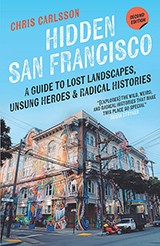

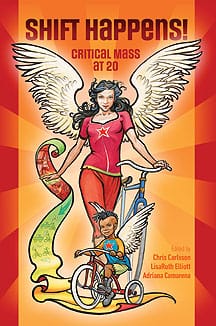
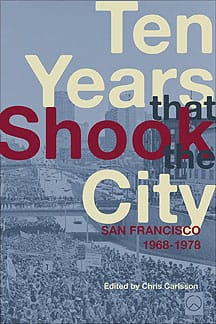
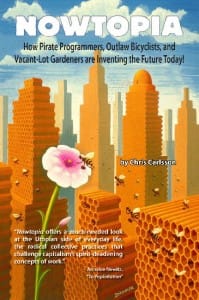
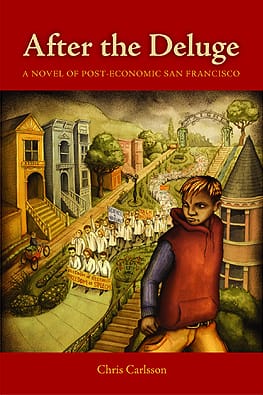
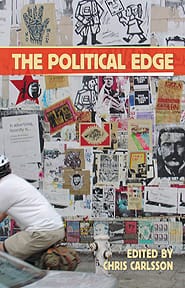
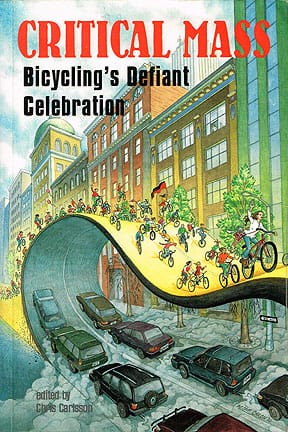
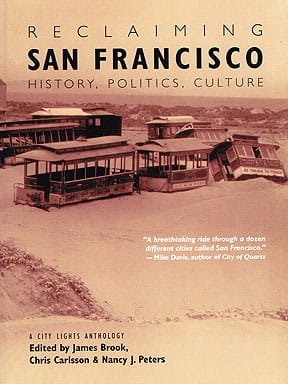
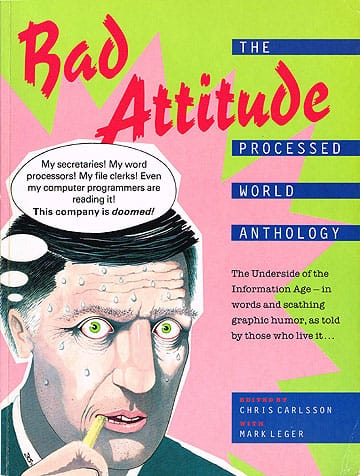
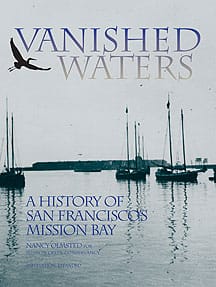
Leave a Reply